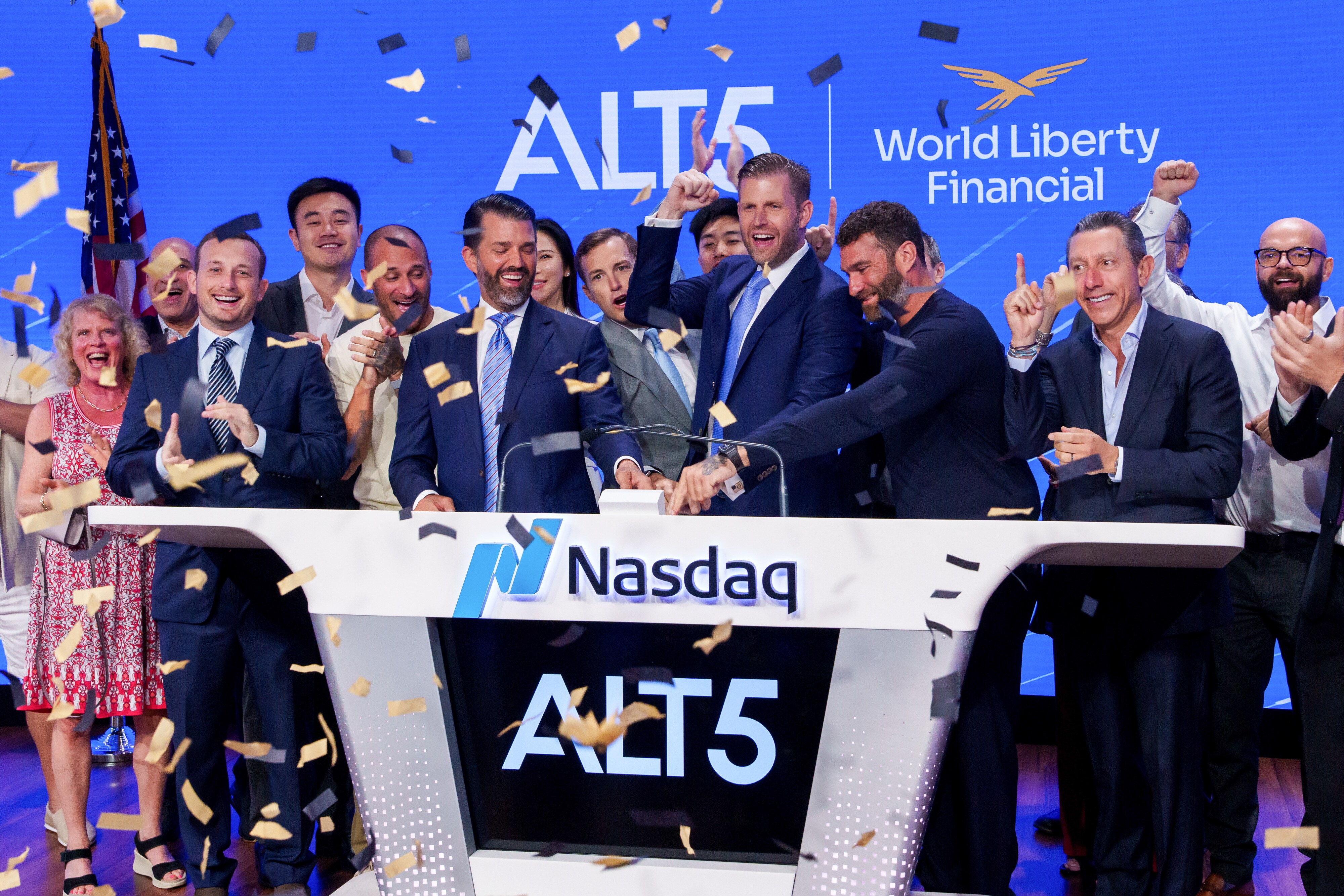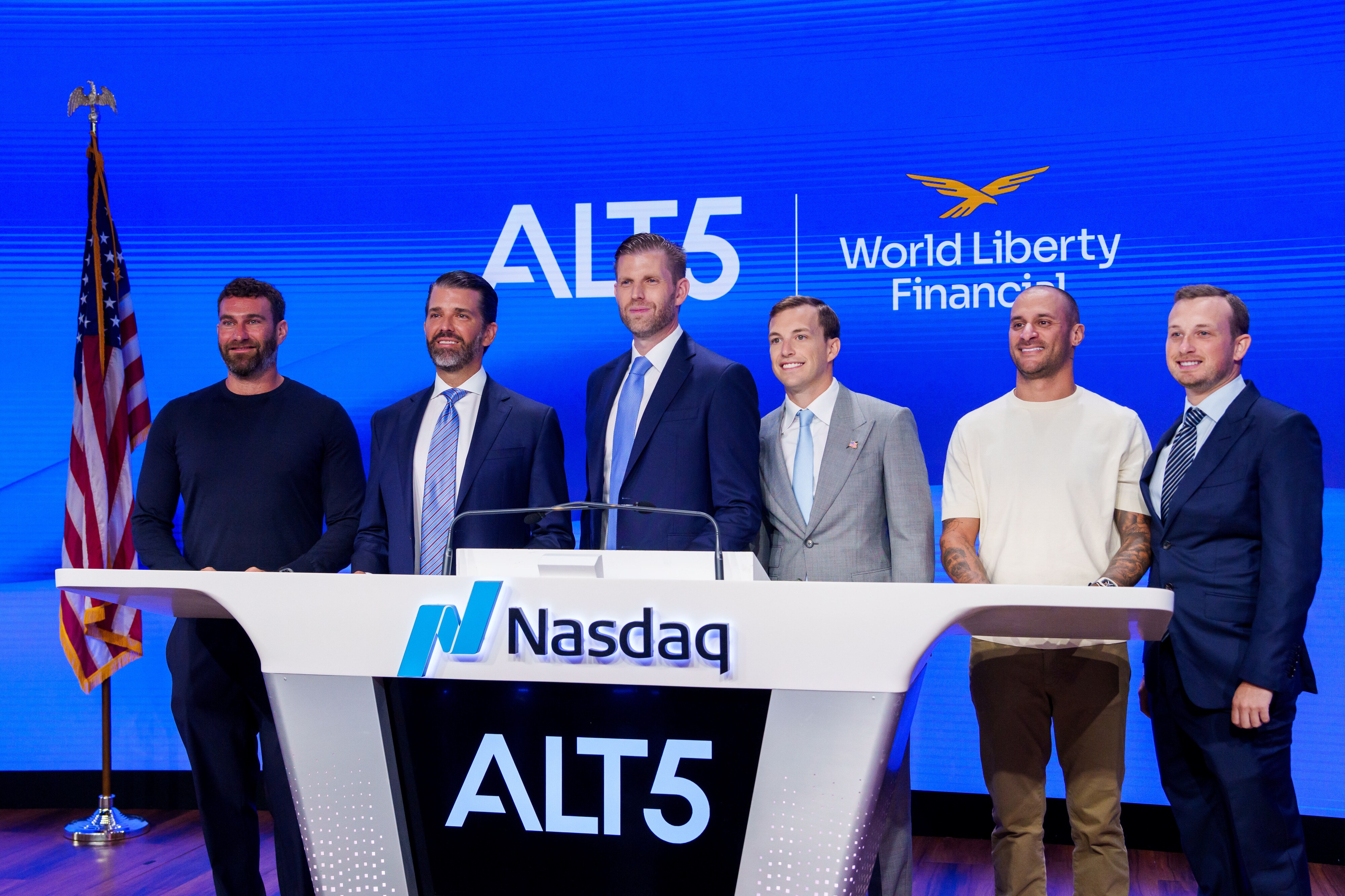
Eric Trump and Donald Trump Jr. grinned as confetti rained down at Nasdaq Inc. in Times Square on Wednesday. The president's sons arrived to celebrate the newest deal for the crypto company they co-founded, World Liberty Financial.
Nasdaq Chief Executive Officer Adena Friedman called the moment a “significant milestone” that puts a public company, pairing up with the roughly one-year-old World Liberty, at the “forefront of decentralized finance.”

Donald Trump Jr., center left, and Eric Trump, center right, ring the opening bell at the Nasdaq MarketSite in New York on Aug. 13. (Photo: Adam Gray/Bloomberg)
Skeptics see the $1.5 billion deal as something else: a leap beyond even the boldest crypto-treasury strategies — bypassing more established coins for a token with no real trading history — in a sign the industry is moving into riskier territory.
The new agreement the Trumps cheered will transform a little-known Las Vegas firm, with roots in biotech and fintech, into a stockpiler of virtual tokens. Yet it goes beyond the usual “crypto treasury strategies” that have flourished in President Donald Trump's second term.
What makes this deal unique is that it centers on World Liberty's WLFI token, which can't even be traded yet on centralized crypto exchanges. The project's co-founders, which also include the sons of the president's special envoy Steven Witkoff, have said they're working to make that happen.
At least one potential investor passed on the deal because there's no open market for the tokens, according to a person familiar with the matter, who asked not to be named discussing private conversations. Even holders of WLFI tokens acknowledge that this week's move is testing the limits of crypto's relationship with the public stock market.
“The creation of a treasury company for a token that has yet to become tradeable is highly unusual,” said Morten Christensen, an investor in WLFI token who also runs AirDropAlert.com. Still, “it could generate heightened market interest” and “the unconventional move may prove beneficial,” he said.
When Eric Trump was asked on Fox Business why an investor should buy shares of the public company rather than waiting to trade WLFI tokens on crypto exchanges, he said that the transaction was about “bringing crypto to the traditional marketplace, which I think so many people want.”
In 2020, Michael Saylor pioneered the strategy of buying Bitcoin with a corporate balance sheet at Strategy, formerly called MicroStrategy. This time, it's a public-market vault for an unlisted token backed by a political brand. Bankers and lawyers have created a cottage industry around stuffing small, under-the-radar companies with crypto — mostly Bitcoin and the likes of Ether. The WLFI deal shows they're expanding into more exotic virtual assets, deepening the link between speculative tokens and public securities.
Though virtual assets were initially popularized as a way to circumvent the traditional, regulated financial system in the US, that approach has been turned on its head as companies shift to become buyers of Bitcoin and other virtual currencies.
The WLFI arrangement centers around ALT5 Sigma Corp., focused on financial technology. Before it closed a deal to raise $1.5 billion, the firm's market value hovered below $150 million — promptly jumping to nearly $850 million this week. It said it would use the funds to transform itself into a holder of World Liberty's WLFI tokens, owning 7.5% of total supply.

Co-founder of World Liberty Financial Zak Folkman, from left, Donald Trump Jr., Eric Trump, Co-founder and CEO of World Liberty Financial Zach Witkoff, Co-founder of World Liberty Financial Chase Herro and Co-founder of World Liberty Financial Alex Witkoff at the Nasdaq MarketSite in New York on Aug. 13.
Features of crypto treasury deals may appeal more to those arranging them than to public investors. For one, there's a potential tax advantage: selling crypto triggers capital gains taxes, but warehousing tokens inside a public company can defer them.
Typically, companies that primarily amass securities could be regulated as investment managers. But the Securities and Exchange Commission under Trump, who ran on a platform to make the US the “crypto capital of the world,” has made it clear that most tokens wouldn't be classified as securities, making the treasury strategy more appealing.
More than 160 other companies have followed Saylor's lead and hold Bitcoin on their balance sheets, according to BitcoinTreasuries.net, and more have formed around popular tokens like Ether. Both have large market caps, millions of users and have been deemed non-securities.
Lex Sokolin, managing partner at Generative Ventures, said treasury strategies make more sense for such tokens with long track records.
“It's difficult to understand why WLFI is using a public equity vehicle to invest in the token at this stage, other than to create buying pressure,” he said.
Alliance Global Partners, which worked on the ALT5 deal, has previously crafted treasury deals outside the very biggest tokens. AGP last month arranged for Mill City Ventures III, a Wayzata, Minnesota-based financial firm, to stockpile SUI tokens, among the top 20 coins tracked by CoinMarketCap.com.
In some ways, the rush of companies looking to get into crypto echoes the speculation that swelled in the run-up to the 2008 financial crisis, said Austin Campbell, managing partner of Zero Knowledge Consulting, a group that works with clients on stablecoins, payments and other crypto topics.
“The premise is that the assets have to keep appreciating,” he said.
Essential Business Intelligence, Continuous LIVE TV, Sharp Market Insights, Practical Personal Finance Advice and Latest Stories — On NDTV Profit.























